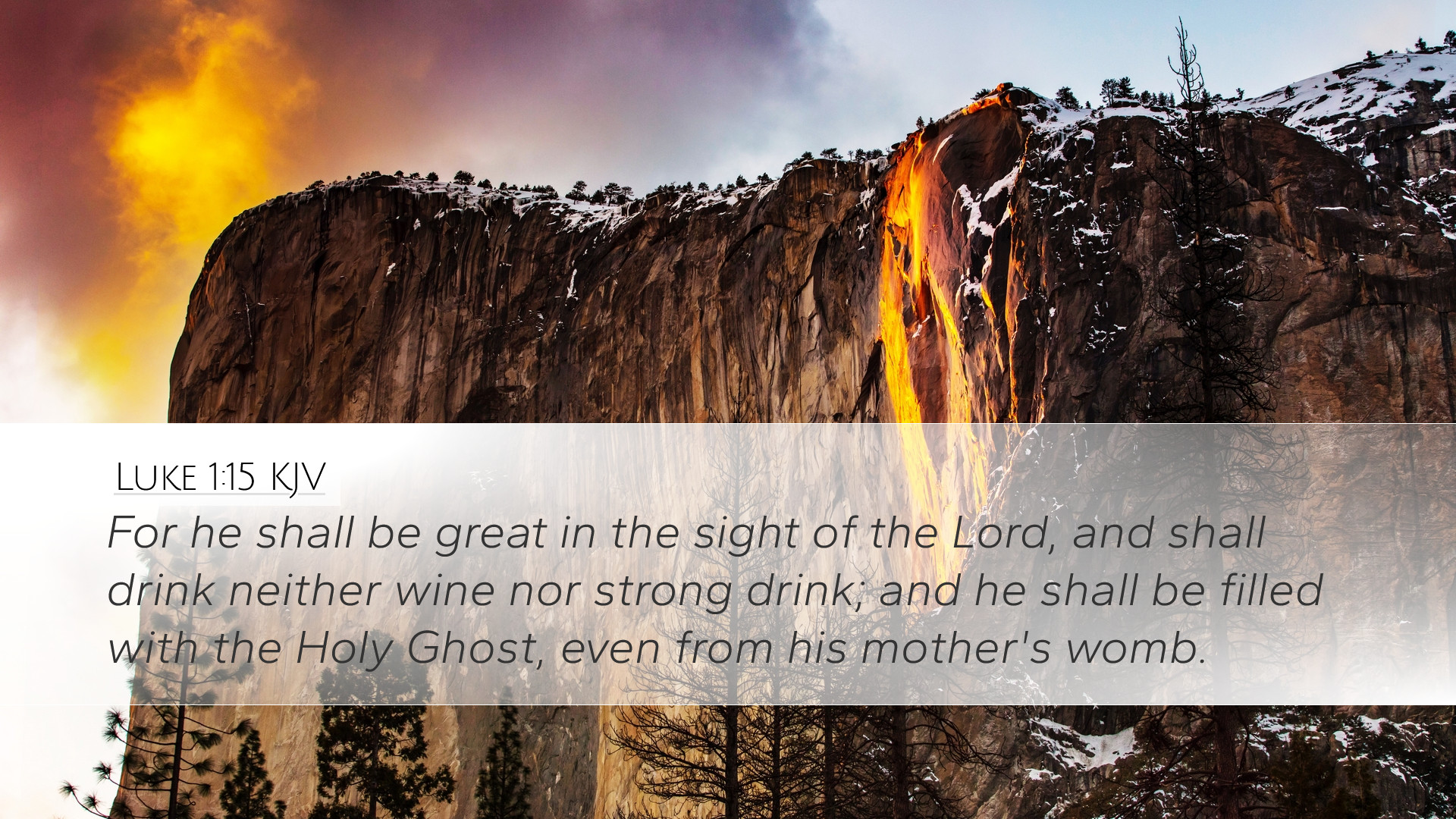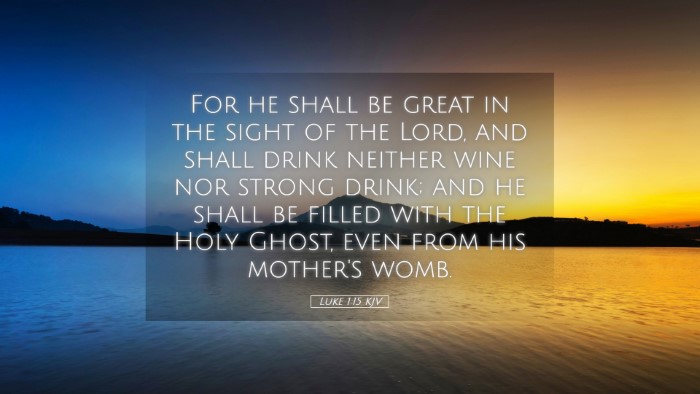Commentary on Luke 1:15
Bible Verse: "For he will be great in the sight of the Lord, and he will drink no wine or strong drink, and he will be filled with the Holy Spirit, even from his mother's womb."
Introduction
This verse encapsulates the divine designation and mission of John the Baptist. His life and ministry were to be marked by holiness, divine empowerment, and a significant role in God’s redemptive history. The following commentary synthesizes insights from public domain sources, enhancing our understanding of this profound verse.
Exegesis of the Text
At the heart of Luke 1:15 is the pronouncement of the angel Gabriel concerning John the Baptist. The characteristics that define John’s life provide enduring lessons for contemporary faith communities.
1. "For he will be great in the sight of the Lord"
Matthew Henry emphasizes that true greatness is measured not by human standards but by one’s standing in the sight of God. John's greatness is aligned with his obedience and dedication to God's will, underscoring the biblical principle that humility before God is the pathway to true exaltation.
Albert Barnes remarks that John's role was pivotal in preparing the way for Christ. His greatness was not for personal glory but for the purpose of highlighting the significance of Jesus' coming. This challenges modern believers to examine their motives in seeking greatness.
2. "and he will drink no wine or strong drink"
John's abstention from wine and strong drink signifies a life set apart, akin to the Nazarite vow. Adam Clarke notes that this vow was indicative of a deeper commitment to God’s purposes. For believers today, this illustrates the call to live a life of holiness and restraint, dedicated to God’s service.
The call to abstain from intoxicants is both a physical and spiritual discipline. Matthew Henry observes that such a lifestyle reflects the seriousness of the mission ahead. It teaches modern readers the importance of maintaining integrity and purity in their lives as representatives of Christ.
3. "and he will be filled with the Holy Spirit, even from his mother's womb"
The filling of the Holy Spirit is central to John's identity and mission. Albert Barnes asserts that this infilling signifies divine empowerment essential for the prophetic task John was to undertake. This emphasizes the role of divine enablement in fulfilling God’s purposes, encouraging all believers to seek the Holy Spirit’s guidance and strength.
Adam Clarke further explains that being filled with the Holy Spirit from the womb suggests God's sovereign choice and foreknowledge. This implies that God has plans for each believer even before birth, inviting believers to reflect on God’s purpose for their lives and their need for spiritual empowerment.
Theological Implications
The elements of this verse highlight several key theological implications:
- Divine Sovereignty: God's sovereign choice in selecting John before his birth exemplifies how He orchestrates history and individual lives for His glory.
- Holiness and Separation: John's lifestyle of abstinence calls the modern church to a renewed emphasis on holiness and living counter to cultural norms.
- Empowerment by the Holy Spirit: This serves as a reminder of the critical role of the Holy Spirit in a believer's life, empowering them for service and witness.
Practical Applications
For pastors, students, and theologians, Luke 1:15 offers practical insights:
- Mission-Centered Living: Reflect on the purpose-driven life. Like John, believers should aspire to be great in service to God, focusing on His mission over personal aspiration.
- Cultivating Holiness: Encourage commitment to spiritual disciplines that foster holiness, challenging congregations to live lives reflective of Christ’s character.
- Seeking the Holy Spirit: Emphasize the importance of being filled with the Holy Spirit daily, enabling believers to fulfill their calling and witness effectively.
Conclusion
Luke 1:15 serves as a profound reminder of God's calling on individual lives. As John the Baptist was set apart and filled with the Holy Spirit for a specific purpose, so are all believers called to a life of holiness and service. The insights from respected commentaries deepen our understanding and invite us to reflect on how we live out our faith in light of this powerful scripture.


